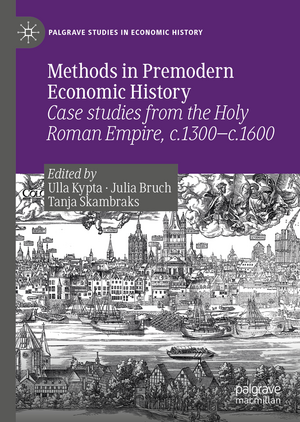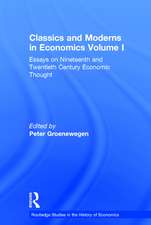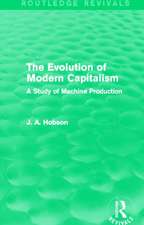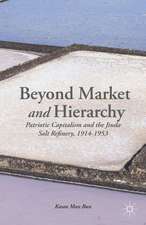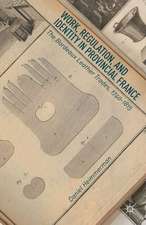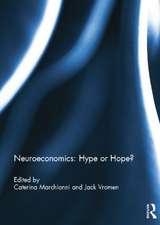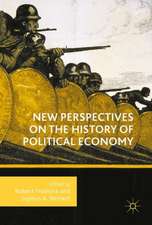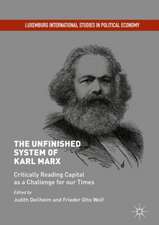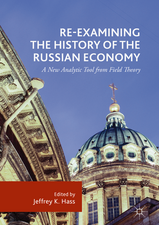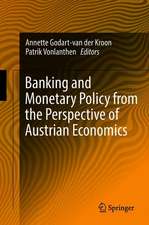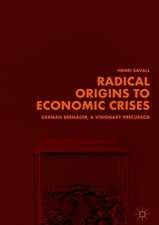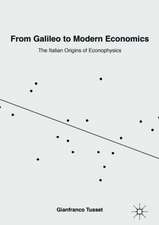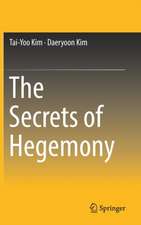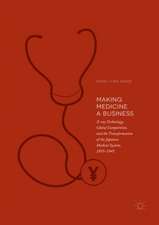Methods in Premodern Economic History: Case studies from the Holy Roman Empire, c.1300-c.1600: Palgrave Studies in Economic History
Editat de Ulla Kypta, Julia Bruch, Tanja Skambraksen Limba Engleză Hardback – 25 oct 2019
Case studies stem from the Holy Roman Empire, one of the most important economic regions in premodern times, and reconnect the German premodern economic history approach with the grand narratives that have been developed mainly for Western European regions. Methodological approaches stemming from economics as well as from sociology and cultural studies show how multifaceted research in economic history can be, and how it might accordingly offer us new insights into premodern economies.
Chapters 9 and 10 are available open access under a Creative Commons Attribution 4.0 International License via link.springer.com.
| Toate formatele și edițiile | Preț | Express |
|---|---|---|
| Paperback (1) | 1006.06 lei 6-8 săpt. | |
| Springer International Publishing – 25 oct 2020 | 1006.06 lei 6-8 săpt. | |
| Hardback (1) | 1019.16 lei 6-8 săpt. | |
| Springer International Publishing – 25 oct 2019 | 1019.16 lei 6-8 săpt. |
Din seria Palgrave Studies in Economic History
- 20%
 Preț: 939.27 lei
Preț: 939.27 lei -
 Preț: 357.88 lei
Preț: 357.88 lei -
 Preț: 497.34 lei
Preț: 497.34 lei - 17%
 Preț: 361.80 lei
Preț: 361.80 lei -
 Preț: 292.28 lei
Preț: 292.28 lei - 15%
 Preț: 580.36 lei
Preț: 580.36 lei - 20%
 Preț: 690.47 lei
Preț: 690.47 lei - 17%
 Preț: 361.38 lei
Preț: 361.38 lei - 18%
 Preț: 945.79 lei
Preț: 945.79 lei - 18%
 Preț: 1012.53 lei
Preț: 1012.53 lei -
 Preț: 384.31 lei
Preț: 384.31 lei - 15%
 Preț: 587.85 lei
Preț: 587.85 lei - 15%
 Preț: 700.29 lei
Preț: 700.29 lei - 18%
 Preț: 782.42 lei
Preț: 782.42 lei - 15%
 Preț: 644.82 lei
Preț: 644.82 lei -
 Preț: 232.82 lei
Preț: 232.82 lei - 18%
 Preț: 899.21 lei
Preț: 899.21 lei - 18%
 Preț: 786.66 lei
Preț: 786.66 lei -
 Preț: 397.97 lei
Preț: 397.97 lei -
 Preț: 388.90 lei
Preț: 388.90 lei - 18%
 Preț: 737.57 lei
Preț: 737.57 lei -
 Preț: 387.20 lei
Preț: 387.20 lei - 15%
 Preț: 647.73 lei
Preț: 647.73 lei - 15%
 Preț: 646.62 lei
Preț: 646.62 lei -
 Preț: 422.90 lei
Preț: 422.90 lei - 18%
 Preț: 955.40 lei
Preț: 955.40 lei -
 Preț: 419.06 lei
Preț: 419.06 lei - 15%
 Preț: 459.06 lei
Preț: 459.06 lei - 15%
 Preț: 712.22 lei
Preț: 712.22 lei - 18%
 Preț: 787.47 lei
Preț: 787.47 lei - 18%
 Preț: 1128.57 lei
Preț: 1128.57 lei - 18%
 Preț: 949.55 lei
Preț: 949.55 lei - 15%
 Preț: 471.53 lei
Preț: 471.53 lei - 15%
 Preț: 640.88 lei
Preț: 640.88 lei - 18%
 Preț: 898.26 lei
Preț: 898.26 lei - 18%
 Preț: 1394.21 lei
Preț: 1394.21 lei - 18%
 Preț: 730.47 lei
Preț: 730.47 lei - 15%
 Preț: 711.56 lei
Preț: 711.56 lei - 18%
 Preț: 783.98 lei
Preț: 783.98 lei - 18%
 Preț: 900.01 lei
Preț: 900.01 lei - 18%
 Preț: 896.08 lei
Preț: 896.08 lei - 15%
 Preț: 705.83 lei
Preț: 705.83 lei - 18%
 Preț: 787.15 lei
Preț: 787.15 lei - 15%
 Preț: 704.69 lei
Preț: 704.69 lei - 18%
 Preț: 1112.48 lei
Preț: 1112.48 lei -
 Preț: 384.31 lei
Preț: 384.31 lei
Preț: 1019.16 lei
Preț vechi: 1242.89 lei
-18% Nou
Puncte Express: 1529
Preț estimativ în valută:
195.03€ • 203.88$ • 164.81£
195.03€ • 203.88$ • 164.81£
Carte tipărită la comandă
Livrare economică 06-20 martie
Preluare comenzi: 021 569.72.76
Specificații
ISBN-13: 9783030146597
ISBN-10: 3030146596
Pagini: 400
Ilustrații: XIII, 511 p. 3 illus., 2 illus. in color.
Dimensiuni: 148 x 210 mm
Greutate: 1 kg
Ediția:1st ed. 2019
Editura: Springer International Publishing
Colecția Palgrave Macmillan
Seria Palgrave Studies in Economic History
Locul publicării:Cham, Switzerland
ISBN-10: 3030146596
Pagini: 400
Ilustrații: XIII, 511 p. 3 illus., 2 illus. in color.
Dimensiuni: 148 x 210 mm
Greutate: 1 kg
Ediția:1st ed. 2019
Editura: Springer International Publishing
Colecția Palgrave Macmillan
Seria Palgrave Studies in Economic History
Locul publicării:Cham, Switzerland
Cuprins
Chapter 1: Introductory Remarks.- Chapter 2: Grand Narratives in Premodern Economic History.- Chapter 3: Introduction into the Study of Production.- Chapter 4: Introduction into the Study of Markets.- Chapter 5: Introduction into the Study of Money and Credit.- Chapter 6: Reviewed Sample Studies on Production.- Chapter 7: Reviewed Sample Studies on Markets.- Chapter 8: Reviewed Sample Studies on Money and Credit.- Chapter 9: Glossary of Methodological Approaches.- Chapter 10: Glossary of Sources.- Chapter 11: Conclusion: How to Do Economic History?.
Notă biografică
Ulla Kypta is Assistant Professor at the University of Basel, Switzerland. Her research interests include medieval economic history, trade in the late Middle Ages and administrative history.
Julia Bruch is Assistant Professor at the University of Cologne, Germany. Her research interests include medieval economic history, artisan and urban culture in the late Middle Ages and the history of monasteries.
Tanja Skambraks is Assistant Professor at the University of Mannheim, Germany. Her research interests include medieval economic history, banking in the late Middle Ages and ritual history.
Julia Bruch is Assistant Professor at the University of Cologne, Germany. Her research interests include medieval economic history, artisan and urban culture in the late Middle Ages and the history of monasteries.
Tanja Skambraks is Assistant Professor at the University of Mannheim, Germany. Her research interests include medieval economic history, banking in the late Middle Ages and ritual history.
Textul de pe ultima copertă
This edited collection demonstrates how economic history can be analysed using both quantitative and qualitative methods, connecting statistical research with the social, cultural and psychological aspects of history. With their focus on the time between the end of the commercial revolution and the Black Death (c. 1300), and the Thirty Years’ War (c. 1600), Kypta et al. redress a significant lack of published work regarding economic history methodology in the premodern period.
Case studies stem from the Holy Roman Empire, one of the most important economic regions in premodern times, and reconnect the German premodern economic history approach with the grand narratives that have been developed mainly for Western European regions. Methodological approaches stemming from economics as well as from sociology and cultural studies show how multifaceted research in economic history can be, and how it might accordingly offer us new insights into premodern economies.
Chapters 9 and 10 are available open access under a Creative Commons Attribution 4.0 International License via link.springer.com.
Caracteristici
Redresses the significant lack of published work regarding economic history methodology in the premodern period Effectively demonstrates the value in using both quantitative and qualitative research methods Contains a vast number of case studies from the Holy Roman empire, one of the most important economic regions in premodern times
